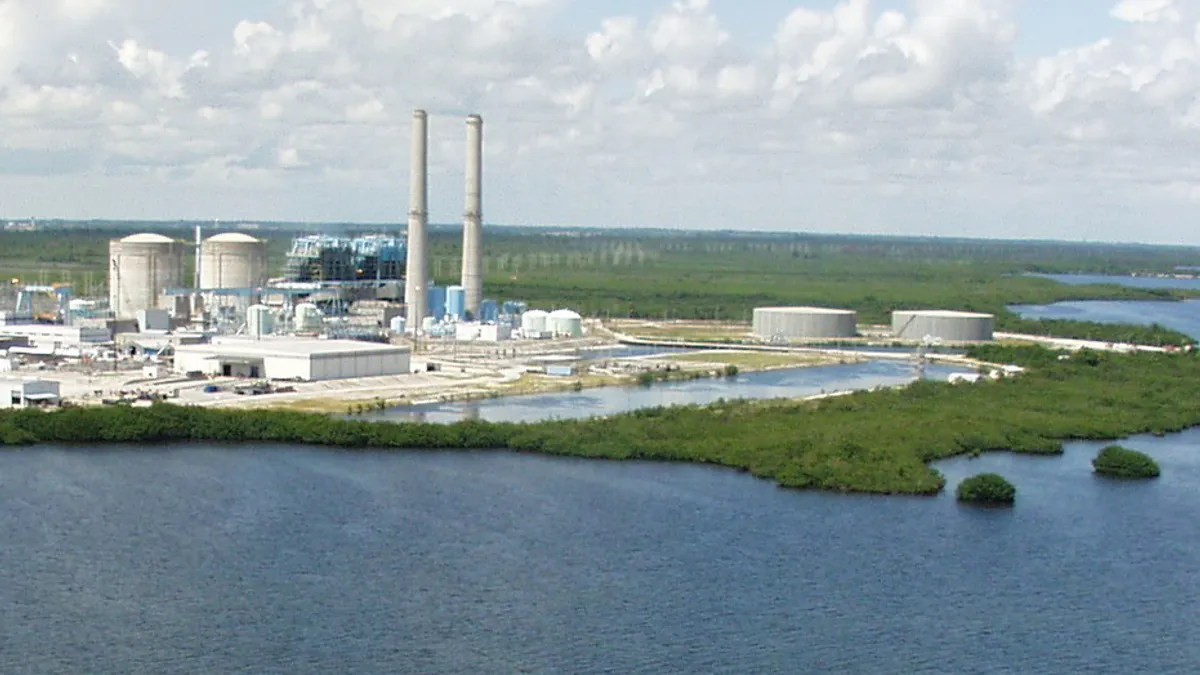Dive Brief:
- Florida Power & Light Co. will take steps to improve water quality around its Turkey Point nuclear plant over a period of ten years, which has been leaking salty water into Biscayne Bay, after agreeing to a consent order with the Florida Department of Environmental Protection, the Palm Beach Post reports.
- The plan calls for FPL to install a recovery system to capture hypersalinated groundwater and store it underground, separate from drinking water sources. The utility stressed that the plant's water quality issues involve the cooling canal system and do not impact the safety of the plant or public health.
- FPL also agreed to immediately undertake restoration projects on the east side of the cooling canals, including restoring an area called Turtle Point to its previous natural state. The utility has already taken some actions to reduce salinity, but the consent order calls for continued progress.
Dive Insight:
The state of Florida directed FPL to take extensive actions to improve water quality around the Turkey Point nuclear facility, located about 25 miles from Miami, after a salt plume of water was found leaking into the Bay, along with the radioactive isotope tritium. Among the consent agreement's directions, FPL will recover and sequester hypersalinated water in underground bedrock separate from drinking water sources, and take on projects to undo damage.
"With this consent order, we are now positioned to realize further improvements in water quality in and around the cooling canals at Turkey Point," FPL President and CEO Eric Silagy said in a statement. "We believe this plan, which we hope will not be challenged and subsequently delayed, will address the cooling canal system issues at Turkey Point while protecting the surrounding environment. I'm confident that the fact-based solutions we'll be implementing at Turkey Point will have a lasting positive impact."
The utility pointed out past actions it has taken to address the Turkey Point issues. FPL said the long-term plan "complements" other actions the utility has taken in the past year to reduce salinity in the Turkey Point cooling canal system. And the consent order is the result of a "months-long process and was developed in consultation with regulatory agencies and independent experts in hydrology, environmental conservation and wildlife protection."
As part of the plan, FPL will install a recovery system to capture and store hypersalinated groundwater away from drinking water sources.
The utility spoke with the Palm Beach Post, giving a few more details, including that this will be a multi-year process. “We are going to pull it back to the boundaries of the cooling canal system” FPL spokesman Peter Robbins told the paper. “The majority of the plume will be retracted within the first five years. Our goal is to get it all. We think that will take longer.”
The water quality issues have not helped FPL's bid to construct two new units at the Turkey Point facility. Florida Senate committees have held hearings this year to investigate how the existing plant is impacting the environment. And in April, the 3rd District Court of Appeal in Miami reversed the state's decision to allow the reactors.
Turkey Point Units 3 and 4 were built in 1972 and 1973, respectively, and their licenses expire in 2032 and 2033. Cooling water is provided through 168 miles of canals, and the plant generates enough power for about 900,000 homes.















